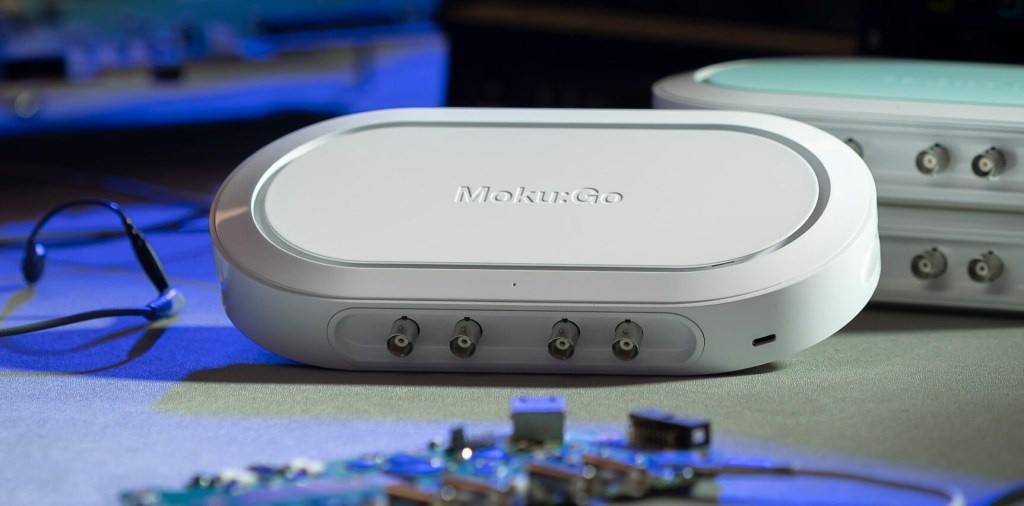Engineering innovations are a critical cornerstone in the evolution of technology, but ironically there haven’t been as many innovations in engineers’ tooling itself. Now, a startup called Liquid Instruments that’s devised a set of software and hardware to help engineers carry out one aspect of their work — testing — more efficiently is announcing a capital injection of $28.5 million to fuel its growth. It’s been on a roll with sales up 4x this year, with customers of its devices including NASA (where the founders first worked on the concept), Google and Qualcomm, Stanford and Duke, and the U.S.’s National Institute of Standards and Technology.
Moore’s Law is alive and well here: The startup’s unique selling point is that it has built a new take on testing equipment by translating much of the process into software that sits on hardware that’s faster, many times smaller and less costly than traditional testing equipment, and provides other kinds of flexibility, such as more dynamic visualizations, diagnostics, programability and the ability to work on the tests in the cloud.
This Series B round of equity funding, which I understand values the company at north of $100 million, will help Liquid Instruments continue to build out more hardware models, and to write more software-based testing tools for those devices.
The company — founded originally in Australia and now officially headquartered in San Francisco — today sells three versions of its Moku hardware — the Go, the Lab and the Pro, respectively starting at $599, $3,500 and $12,000. They are part of a bigger area of software-defined test instrumentation, and Daniel Shaddock, the CEO and co-founder, first worked on a version of this tech when he was on a team building testing equipment in NASA’s Jet Propulsion Laboratory for high-precision wave detection using a similar software-defined approach.
After that project was done, Shaddock said he and some 11 others would have been “scattered to the wind”, working at other space agencies or academia, so he suggested that maybe they continue working together, to see how a similar concept could be applied to building testing equipment for the engineering world and academics at large. “It was great measurement technology,” he said, “so we thought, maybe others might like it, too.”
The devices use standard input ports and are based on flexible FPGA chip architecture. Today those chips are Xilinx chips from AMD, but the company is open to using “whatever the chip du jour might be” said Shaddock. That’s because its IP is not about the chips but about how they’re used to work “at the crossroads of analogue circuitry and digital processing,” he said. “What has been done previously on analogue devices, and distributed across many chips, are now all on FPGA chips. Now that they are larger, we can slice up the chip into more functions, and have them all work together.”
Although this is bringing down the price of testing devices, it’s not exactly putting Liquid Instruments into the category of electronics companies building tools for hobbyists. Its customers rather span research and education through to government labs and industrial businesses, with applications including aerospace, defense, semiconductor, lidar and quantum computing. And it’s finding a lot of traction in all of them, with sales up four-fold in the last year.
The investors in this round also are a testament to its traction. Led by Acorn Capital, it also includes strategics like Lockheed Martin Ventures and Powerhouse Ventures, as well as previous backers Spirit Super/ANU Connect Ventures, MA Growth Ventures, Significant Capital Ventures and Boman Enterprises. Liquid Instruments has to date raised $50 million.
“Liquid Instruments is creating a versatile test and measurement platform that is customizable and efficient,” said Chris Moran, vice president and general manager of Lockheed Martin Ventures, in a statement. “This technology has the potential to deliver mission critical functionality that can provide value to our customer. We are excited by Liquid’s continued growth and look forward to strengthening our collaboration.”
“Liquid Instruments’ Australian-developed software-defined approach is the manifestation of an ambitious plan targeting a vital market that has suffered from a deficit of innovation and imagination,” added Robert Routley, CEO, Acorn Capital. “We see tremendous potential for their platform to continue to grow and evolve, benefitting more industries over time. Liquid Instruments is well positioned to execute on its expansion strategy and disrupt the test and measurement sector and lead the industry through the much-needed transition from hardware to software.”
5 tips for scaling your green startup during a funding drought
“This injection of capital will supercharge our ability to revolutionize the test and measurement industry,” said Shaddock. “Our innovative software-first approach provides clear advantages over traditional hardware-based solutions, and this funding strongly positions us to lead this critical industry transformation.”
Liquid Instruments’ Moku product line offers the world’s most powerful and flexible software-defined instrumentation platform, harnessing the processing power and reconfigurability of Field Programmable Gate Arrays (FPGAs) to combine multiple instruments into one compact and accessible device. These product offerings include the Moku:Go, a complete lab solution for engineers and students to actively test designs and projects, and the Moku:Pro, an integrated platform for the most demanding research and engineering applications.
“We are focused on enhancing cloud integration features for our products and scaling production of Moku:Go to help millions of undergraduate engineering students around the world unlock their full potential,” added Shaddock. “Mokus will continue to receive new features via frequent over-the-air updates enabling new solutions in key commercial industries.”































Comment